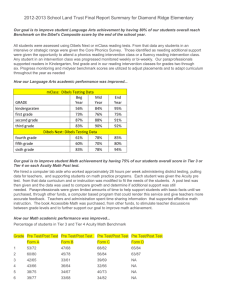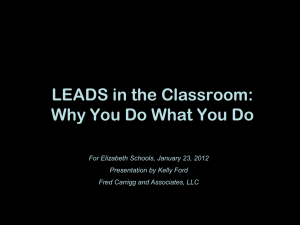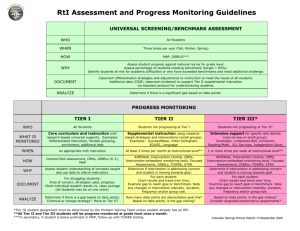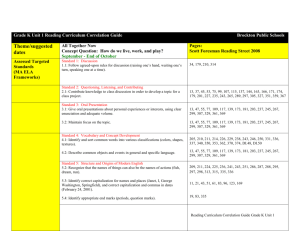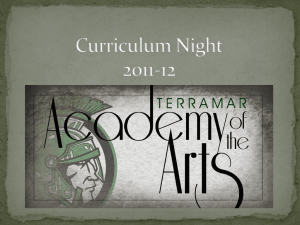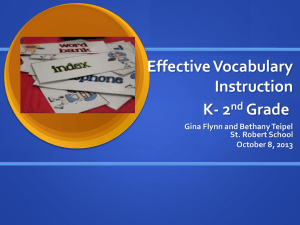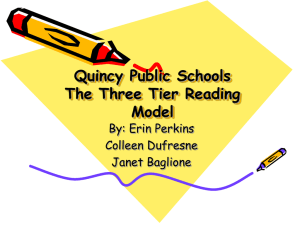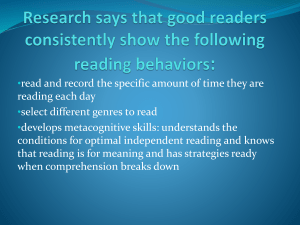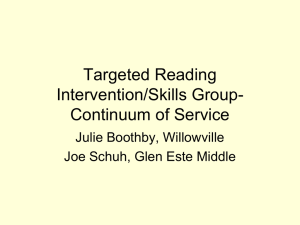Reading Program
advertisement
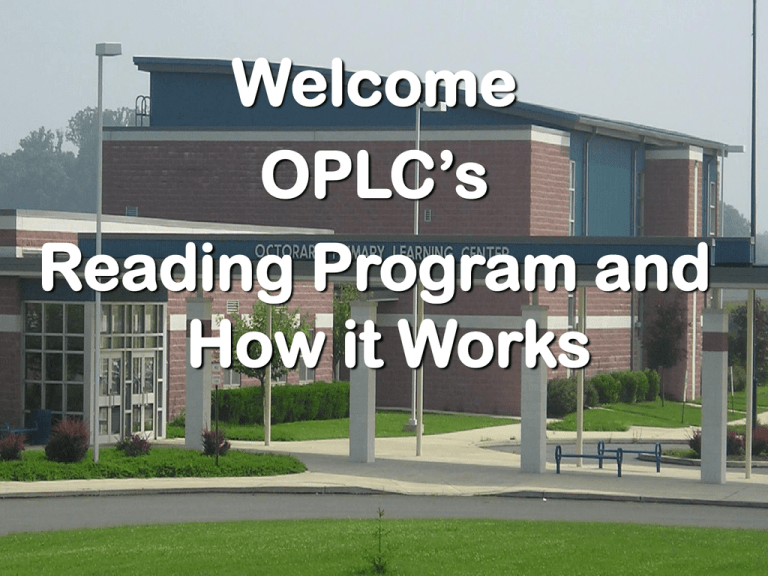
Welcome OPLC’s Reading Program and How it Works OPLC Overview • Balanced Reading Program – Reading Block – Whole Group Reading • Assessments – Grouping • Supports/Enrichment Independent reading-Independent writing Shared reading-Shared writing Guided reading-Guided writing Modeled reading (read aloud)-Modeled writing Word Study Strands of Reading The 5 Critical Elements of Reading Phonemic Awareness Vocabulary Comprehension Fluency Alphabetic Principle Graphic by: Deborah Simmons DIBELS/Progress Monitoring DRA Project Read Daily Dictation Project Read Unit Assessments Scott Foresman Benchmark Assessments Terra Nova Regularly Scheduled Data & Collaboration Meetings Developmental Reading Assessment (DRA) • Administered 2/4x a year in kindergarten, first and second grade. • Assesses and documents reader’s development at instructional levels • Results determine reading block placement. Dynamic Indicators of Basic Early Literacy Skills (DIBELS) 1. Phonemic Awareness 2. Alphabetic Principle and Basic Phonics 3. Word Attack Skills 4. Accurate and Fluent Reading of Connected Text 5. Comprehension Homogeneous Group (Instructional Reading Level/Reading Block) 80 Minutes Long Three Reading Levels ◦ Title Groups/Working Towards ◦ Average ◦ Above Grade Level Project Read/Word Study Guided Reading 1. DRA ◦ 1st grade - Level 3 (Strategic/Core with Concerns) or below ◦ 2nd grade - Level 16 (Strategic/Core with Concerns) or below 2. DIBELS- Strategic/Intensive 3. 2nd grade only ◦ Below an average of 75% on previous year’s Core/benchmark scores for Scott Foresman 4. Teacher observation of ongoing student performance: This can include work samples, weekly assignments, ongoing progress monitoring, etc. To be in this category, the child must have the following criteria. 1. DRA ◦ 1st grade - Level 3 - 14 ◦ 2nd grade - Level 16 (Independent) or above 2. DIBELS-Strategic/Benchmark 3. An average of 75% on previous year’s benchmark scores for Scott Foresman 4. Teacher observation of ongoing student performance: This can include work samples, weekly assignments, ongoing progress monitoring, etc. Students must meet the following criteria to be in this category. 1. DRA ◦ 1st grade - Level 16 or above ◦ 2nd grade - Level 24 or above 2. DIBELS – Core/Benchmark 3. An average of 90% or above on previous year’s benchmark scores for Scott Foresman 4. Teacher observation of ongoing student performance: This can include work samples, weekly assignments, ongoing progress monitoring, etc. Project Read Skills Anticipatory Set: Warm Up Guided Reading Monitoring comprehension Use graphic and semantic Skill Introduction Teach to Transfer Answering questions Checking for Understanding Generating questions Recognizing story structure Dictation Shared reading Guided reading Summarizing Automaticity and Fluency organizers Heterogeneous Group (Mixed ability grouping/Homeroom) 60 Minutes Long Grade Level Materials Whole Group Instruction ◦ With Differentiation Scott Foresman Writing Process Independent Reading Shared Reading & Shared Writing ◦ Monitoring comprehension ◦ Use graphic and semantic organizers ◦ Answering questions ◦ Generating questions ◦ Recognizing story structure ◦ Summarizing Grammar Process Writing/Journal Independent Reading & Writing Tier 1: Core Curriculum Tier 2: Strategic Interventions Reading Reading • PA State Standards • Block Reading • Grouped by instructional reading level Tier 3: Intensive Interventions Reading •Extension of Tier 1 •Extension of Tier 1 & 2 • Title I Reading Support • Title I Reading Support ADDITIONAL • Data Driven READING Instruction SUPPORTS PROVIDED • Weekly/Biweekly Progress BASED Monitoring ON DATA & • Change TEACHERInterventions VALIDATION • Data Driven Instruction • Systematic, Explicit Reading Instruction • Weekly Progress Monitoring •Curriculum Fidelity & Consistency • Intensity & Duration of Interventions • Researched Based Programs & Techniques • Universal Screenings – DIBELS, DRA • Data Driven Instruction •Extra Support in Reading Block & Tier Time • Additional Small Group Instruction •Extra Support through Small Group Instruction Establish Learning Goals Reading Individual Apply Learned Concepts ◦ Application & transfer of taught concepts used throughout all subject areas Knowing Instructional Focus of Lesson ◦ Understand & be able to explain the lesson’s purpose- why it is critical to learn this chunk of information, on this day, and in this way Be in the KNOW ◦ ◦ ◦ ◦ Child’s Academic Levels Student Reading Goals Attend Parent Conferences Provide Current Phone Numbers Support/Parent Involvement ◦ ◦ ◦ ◦ ◦ Home Support Participation in Reading Incentive Program Reading Eggs Attendance Read, Read, Read with your child Model Expectations ◦ Motivate ◦ Encourage/Support/Provide ◦ Enforce
